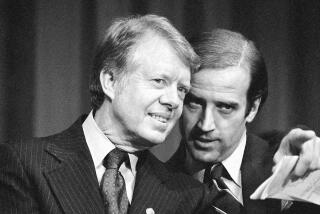If Gore had won ...
Only partly in the spirit of “Saturday Night Live,” which once asked how World War II would have been affected if Eleanor Roosevelt could fly, I’d like to ask a “what if” question: How would the current discourse about civil liberties in an age of terrorism be different if Al Gore, rather than George W. Bush, had been elected president in 2000?
One possible difference is that we probably wouldn’t be debating how (if at all) the war on terrorism related to the war in Iraq. But I’m more intrigued by that sector of the multiverse in which Gore won, 9/11 happened and U.S. military retaliation was limited to Afghanistan ..... yet other preventative measures were still taken on the home front.
It’s a useful thought experiment because so much of the criticism of Bush’s “assault on civil liberties” - shorthand for the Patriot Act, National Security Agency eavesdropping on citizens suspected of ties to terrorists, Guantanamo - operates on a kind of unified field theory of Bush perfidy. Having stolen the election in Florida, Bush lied us into Iraq, then set about trashing Americans’ privacy on the bumper-sticker pretext of the war on terrorism.
It’s no accident that Democrats who supported the recent “temporary fix” in the Foreign Intelligence Surveillance Act did so in spite of, not because of, Bush’s championing of the bill. In defending her vote in favor, Sen. Dianne Feinstein (D-Calif.) emphasized how much she trusted not the president but Director of National Intelligence J. Michael McConnell.
So riddle me this, Bush-bashers: If President Gore, not President Bush, had been in office on 9/11 when the World Trade Center towers fell, would civil liberties have survived the war on terrorism unscathed?
Those who would answer “yes” can argue that Gore would not have received counsel from executive-power maximalists such as Dick Cheney and Justice Department official John Yoo. Instead, Gore would be counseled by hawkish Vice President Joe Lieberman, with some kibitzing from his Democratic predecessor, Bill Clinton.
But what makes this “what if” exercise so fascinating is that it is far from a slam dunk (as former CIA Director George Tenet, a Clinton appointee, might say) that a Gore administration wouldn’t have done at least some of the things for which Bush has been pilloried.
It was Clinton, not Bush, who defied the ACLU by signing the 1996 Anti-Terrorism and Effective Death Penalty Act, which Congress passed on the first anniversary of the Oklahoma City bombing. The AEDPA is best known, and most loathed, for the hurdles it established for prisoners seeking to challenge their state convictions in federal court. But the legislation also criminalized the providing of “material support” for terrorists, made it easier to deport suspected terrorists and allowed the use of classified information not shown to the defendant.
If there is one aspect of the war on terror that encapsulates the Bush administration’s alleged insensitivity to civil liberties, it’s the monitoring by the NSA of e-mails and telephone calls between “U.S. persons” and persons abroad suspected of ties to Al Qaeda. After five years, this so-called Terrorist Surveillance Program was brought under supervision by a secret court, only to be liberated at least in part from judicial oversight as the result of the “FISA fix.”
Even many Republicans thought that the original NSA operation illegally bypassed FISA’s requirements for a court order. But, after the program’s existence was revealed by the New York Times, it was defended by R. James Woolsey Jr., Clinton’s first director of central intelligence.
At a Sept. 7, 2006, American Enterprise Assn. panel discussion, Woolsey said: “My own view is that communications between Al-Qaeda operatives and Americans are battlefield communications. It is not our fault that in this war, unlike Vietnam and Korea, the battlefield is in New York, Washington and the field in Pennsylvania, as well as the rest of the country.”
Stressing the importance of quickly checking e-mail addresses stored on a terrorist’s computer, regardless of 30-year-old laws, Woolsey asked: “How in the world anybody could remotely believe that doing that is consistent with the Foreign Intelligence Surveillance Act, or can be done consistently with the Foreign Intelligence Surveillance Act, a 1970s statute that effectively requires the government to go one-by-one, case-by-case, individual-by-individual .....?”
The point isn’t whether Woolsey was right or wrong in his defense of unilateral eavesdropping by the once-mysterious NSA (which stood, Washington wags used to say, for “No Such Agency”). The point is that you don’t have to be a “loyal Bushie” or even a Republican to support some renegotiation of the relationship between liberty and security. Clinton did after the Oklahoma City bombing, and President Al Gore might well have followed suit after 9/11 with his own versions of the Patriot Act and the Terrorist Surveillance Program.
We’ll never know for sure how President Gore would have reacted in those circumstances, any more than we can assess the contributions of an airborne Eleanor to the war effort. But it’s at least possible that, lacking Bush’s baggage, President Gore might have been even better able to convince Congress that security must trump privacy.
Michael McGough is The Times’ senior editorial writer. Send us your thoughts at [email protected].
More to Read
A cure for the common opinion
Get thought-provoking perspectives with our weekly newsletter.
You may occasionally receive promotional content from the Los Angeles Times.











